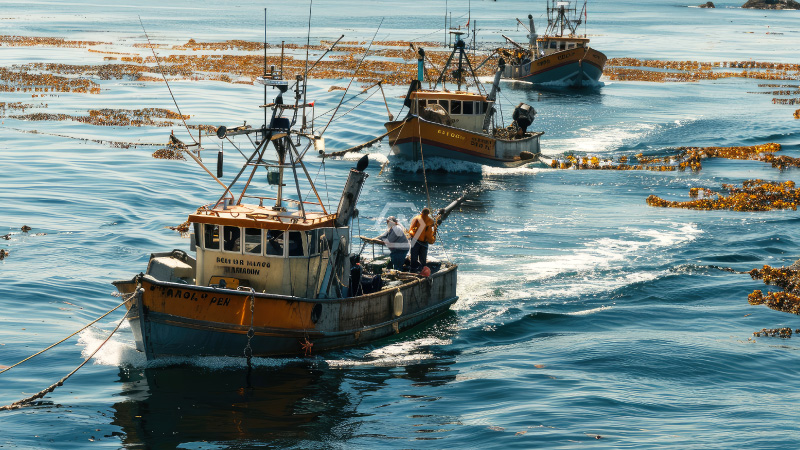- Ghana suspends licenses of four Chinese trawlers for illegal fishing practices, including unauthorized transshipment and catching juvenile fish.
- Saiko and bottom trawling by Chinese trawlers are pushing Ghana’s pelagic fish stocks to the brink of collapse.
- New fisheries minister Emelia Arthur pledges greater transparency and endorses the Global Charter for Fisheries Transparency.
Ghana’s Fisheries Commission and Ministry of Fisheries and Aquaculture have taken a bold step in the fight against illegal, unreported, and unregulated (IUU) fishing. They have suspended the licenses of four Chinese trawlers for a year.
Saiko, a practice involving the transshipment of unwanted fish, has been particularly damaging. It allows industrial trawlers to scoop up fish meant for artisanal fishers. This practice is driving species like sardinella to the brink of collapse.
Illegal Fishing in Ghana: The Cost of Chinese Trawlers’ Exploitation
The suspension of four Chinese trawlers in Ghana reveals the country’s ongoing struggle against illegal, unreported, and unregulated (IUU) fishing. Despite being flagged to Ghana, the vessels Meng Xin10, Florence 2, Long Xiang 607, and Long Xiang 608 are owned by Chinese companies. These companies are notorious for using “flagging in” to evade local laws. These vessels have been linked to the illegal transshipment of fish, a practice known as saiko. This practice is devastating the country’s pelagic fish stocks.
For years, Ghana’s small-scale fisheries sector has suffered as industrial trawlers overexploit local waters. They target juvenile fish and use banned methods like bottom trawling. This situation has driven sardinella stocks to the brink of collapse, threatening the primary source of income for over 100,000 artisanal fishermen. Consequently, incomes for these small-scale fishers have plummeted by 40% per canoe, further exacerbating poverty in coastal communities.
The consequences extend beyond financial losses. The Meng Xin fleet, operated by Dalian Mengxin Ocean Fishery Company, is connected to the 2019 disappearance of Ghanaian fisheries observer Emmanuel Essien. Essien was last seen documenting illegal activities aboard one of the trawlers. The incident underscored the dangers faced by observers, who often work under poor conditions and are susceptible to bribery and coercion.
Emelia Arthur, Ghana’s newly appointed fisheries minister, has vowed to prioritize transparency in the sector. In a bid to enforce accountability, Ghana has endorsed the Global Charter for Fisheries Transparency. This aims to clamp down on illegal practices and protect marine resources for future generations. Arthur’s commitment signals a new era of reform that could reshape the landscape of Ghana’s fisheries industry.
Ghana’s crackdown on illegal fishing by Chinese trawlers marks a pivotal step toward protecting marine resources. It also aims to safeguard the livelihoods of local fishers.
“Saiko is precipitating the collapse of Ghana’s staple fish stock and with it, poverty and hunger for its people.” — Steve Trent, Executive Director, Environmental Justice Foundation



